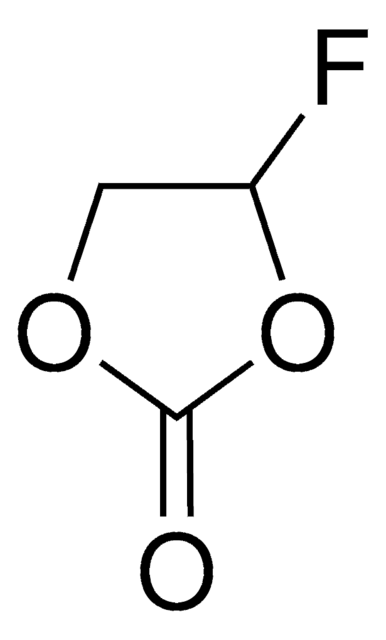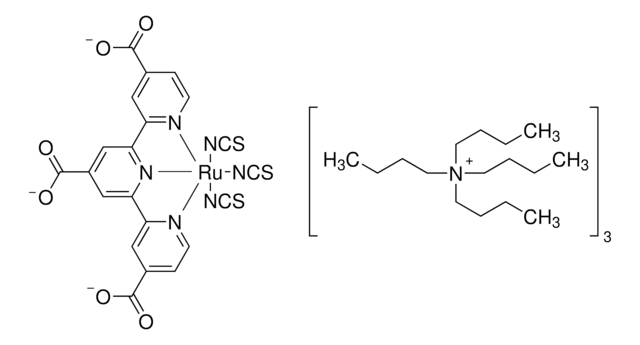791482
EL-HPE high performance electrolyte
Synonym(s):
Greatcell Solar®, EL-HPE, EL-HPE electrolyte
About This Item
Recommended Products
form
liquid
Quality Level
color
semi-transparent amber
refractive index
n20/D 1.392
conductivity
16.5-18.5 mS/cm at 20 °C
density
0.875 g/mL at 25 °C
Application
Due to the low boiling point of the main solvent and the chemistry of the electrolyte mixture; EL-HPE will not provide best long term stability under standard solar conditions and/or under elevated temperature testing
Particularly suitable for glass or metal/glass substrate-based DSC systems.
Legal Information
Greatcell Solar is a registered trademark of Greatcell Solar Materials Pty Ltd.
Signal Word
Danger
Hazard Statements
Precautionary Statements
Hazard Classifications
Acute Tox. 4 Inhalation - Acute Tox. 4 Oral - Eye Dam. 1 - Flam. Liq. 2 - Skin Irrit. 2 - STOT RE 2 Oral - STOT SE 3
Target Organs
Respiratory system, Thyroid
Storage Class Code
3 - Flammable liquids
WGK
WGK 3
Flash Point(F)
46.4 °F
Flash Point(C)
8 °C
Regulatory Listings
Regulatory Listings are mainly provided for chemical products. Only limited information can be provided here for non-chemical products. No entry means none of the components are listed. It is the user’s obligation to ensure the safe and legal use of the product.
PDSCL
Deleterious substance
FSL
Group 4: Flammable liquids
Type 1 petroleums
Hazardous rank II
Water soluble liquid
ISHL Indicated Name
Substances Subject to be Indicated Names
ISHL Notified Names
Substances Subject to be Notified Names
JAN Code
791482-50ML:4548173337456
791482-10ML:4548173337449
791482-BULK:
791482-VAR:
Choose from one of the most recent versions:
Certificates of Analysis (COA)
Don't see the Right Version?
If you require a particular version, you can look up a specific certificate by the Lot or Batch number.
Already Own This Product?
Find documentation for the products that you have recently purchased in the Document Library.
Customers Also Viewed
Articles
Dye-sensitized solar cells (DSCs) are 3rd generation solar cells combining the promise of high efficiency with low production costs.
While dye sensitization as the basis for color photography has been accepted for a very long time,1 attempts to use this principle for the conversion of solar light to electricity generally had resulted only in very low photocurrents, below 100 nA/cm
Our team of scientists has experience in all areas of research including Life Science, Material Science, Chemical Synthesis, Chromatography, Analytical and many others.
Contact Technical Service













